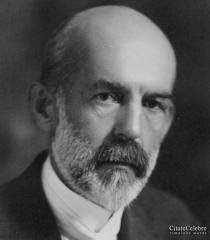Cooley, Charles Horton

Bio: (1864-1929) American sociologist. Charles Cooley completed his undergraduate, master's, and doctoral studies at the University of Michigan in Ann Arbor, where his father was the founder of the Law School. Cooley taught at the same university from 1892 until his death. He is considered one of the most important representatives of early American sociology. He is best known for his trilogy in which he develops his theoretical approach. Cooley was influenced by the philosophical ideas of the transcendentalism of Henry Thoreau and Ralph Emerson, the pragmatism of William James and John Dewey, as well as the sociology of Herbert Spencer. Cooley believed that the explanation of society must be based on individual psychology and social psychology.
In the first part of the trilogy, Human Nature and the Social Order (1902), Cooley starts with the concept of the self, introduced by William James, and examines the development of the self through symbolically mediated interaction. There are three progressive stages in self-development. In the first phase, biologically implanted spontaneity and activity come to the fore; in the second phase, the "social self" develops, when the views of others are absorbed; the third phase is the development of the "looking glass self", which is created by imagining and interpreting the world around us. Looking glass self has three elements: our idea of how we look to another person; imagining what judgment that other person has of our appearance; and our emotional reaction to that person’s attitude toward us (pride, shame).
Cooley rejects the dualism of the individual and society because both contain collective and individual aspects of the same phenomenon. Similarly, he believes that people always exhibit tendencies of individuality and sociality, that’s why it is impossible to separate them. Both tendencies are complementary and arise simultaneously during the development of the self. What mediates between the self and society is "communication" and "understanding". Cooley believes that the self does not have complete autonomy, as the utilitarians believed, nor is it completely determined by social values and norms.
In the second part of the trilogy, the book Social Organization (1909), Cooley introduces the term "primary group", which means a group in which there are close relationships and direct communication. Examples of primary groups are: family, neighborhoods, smaller communities, etc. These groups are most important for shaping a person's social nature and values. Although primary groups are influenced by the values of the wider society in which they exist, all primary groups have some characteristics that are the same, or universal, for all of them. All primary groups develop the ideals of freedom, solidarity, equality, fidelity, and truthfulness. In addition, all primary groups have the same communicative structures. Cooley believes that democracy is a reflection of the values that develop in primary social groups and that non-democratic societies represent failures in building a moral social order.
Communication and organization are key to transferring the values of primary groups to the level of the wider social order. The interaction and mutual influences of individuals are what form public opinion and social order. In democracies, communication takes the form of deliberation, which shapes identities, social ties, and organizational and institutional structures. Cooley sees social classes as a normal part of democracy. When communication between them, on the issue of the economy and cultural capital, takes place in the form of deliberative debate, then democracy is stable, and it becomes endangered when classes close in themselves and refuse to participate in a public debate. Institutions, according to Cooley, can be structures of action (enduring sentiments, beliefs, and customs), large organizations (government, church, judiciary), but also individual "habits of mind and of action". Institutions provide individuals with a choice of possible activities, but also create restrictions, in terms of activities that are not allowed. Institutions change following the change of circumstances, and social disorganization occurs when the actors cannot solve the new problems because there has been a blockade of institutional changes.
In the third part of the trilogy entitled Social Process (1918), Cooley studies how social change occurs. People direct their behaviors following generalized meanings (rules), but at the same time, they explore solutions to specific problems in a creative way. Based on past experiences, actors create new ideas and hypotheses to explore the applicability of a new way of doing things. This activity usually goes through the following process: old habit, conflict, experiment, and new habit. People use "imaginative reconstruction" and "creative synthesis" to shape new habits. By constantly finding new creative solutions, people influence social change, but also the social order. The social order is a process, not a state, and it is constantly subjected to interpretations and reconstructions of general meaning. Rational action is halfway between the rational achievement of clear goals and blind respect for social norms. Cooley, concluding his trilogy, completes his theory.
Fields of research
Actors Classes Communication Conflict Cultural Capital Customs, Social Democracy Economy Emotions Family Freedom Group Human Nature Identity Institution and Organization Morality Personality Psychology Public Opinion Race Rationality Sign and Symbol Socialization SolidarityTheoretical approaches
Symbolic InteractionismMain works
Genius, Fame and the Comparison of Races (1894);
Human Nature and the Social Order (1902);
Social Organization: A Study of the Larger Mind (1909);
Social Process (1918);
Life and the Student (1927);
Sociological Theory and Social Research (1930).

